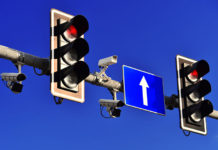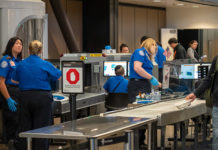Next time you board a commercial airliner, be careful not to sweat too much, glance out the window nervously, visit the bathroom more than once, or [if you are a male passenger] permit your Adam’s apple to bob excessively. Failure to control such movements may land you on a secret government watch list as a suspected terrorist.
The above factors are not lifted from a screenplay for an upcoming episode of Sacha Baron Cohen’s “Who is America.” They are part of an actual list of characteristics included in a previously secret federal government program, code named “Quiet Skies,” administered by the TSA (Transportation Security Administration) and the federal Air Marshal Service, in cahoots with airline personnel.
As noted in recent news reports, the program was launched in 2010 and has steadily evolved into an expanded version of the TSA’s earlier and much-maligned SPOT program (“Screening of Passengers by Observation Techniques”). Like SPOT, a Boston Globe report of the Quiet Skies program confirms that passengers are flagged for all manner of “suspicious” behavior, including but not limited to those noted above.
In a testament to the program’s faulty premises, and as noted also in the Boston Globeanalysis, previous targets of this surveillance include a flight attendant and a federal law enforcement officer. “[J]eez we need to have an easy way to document this nonsense,” one Air Marshal texted his colleague; concluding that, “Congress needs to know that it’s gone from bad to worse.”
Law enforcement’s interest in profiling criminal suspects as a shorthand way to nab lawbreakers, however, remains alive and well; especially in the post-9/11 world. While such methodology may in many respects be sound, the key to constitutionally permissible profiling is to incorporate articulable characteristics in such way as is consistent with the Fourth Amendment, and without injecting factors touching on racial, religious, or other protected criteria.
When passengers are “watched” surreptitiously by government agents, or by airline employees at the behest of those agents, what information is noted, in what form is it collected, where is it maintained, and for how long? Might a law-abiding, but excessively nervous passenger find himself unwittingly on a watch list; a list that becomes part of a vast database of information subject to algorithmic manipulation that might show up in the future as a flag identifying the individual as untrustworthy, or perhaps even unfit to purchase a firearm or engage in other endeavors?
These are not crazy, hypothetical questions; and citizens have a right to know whether, how, why and to what extent, their movements are being surveilled and cataloged by government agents simply because they have decided to travel by air.
Flying aboard commercial airlines already is fraught with discomfort and tension. Must we now also have to be concerned that an overactive sweat gland, a jittery Adam’s apple, or a second trip to the lilliputian restroom might land us on a secret watch list?






























